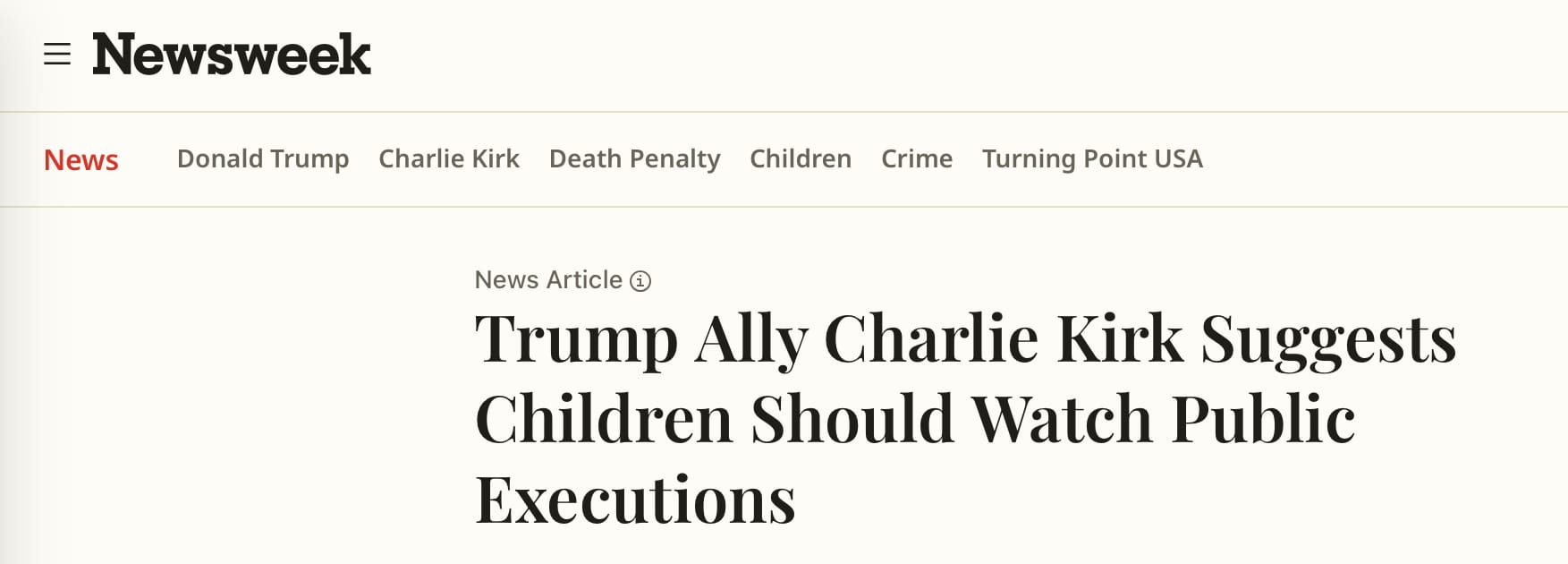The Watch List

In a children's literature class at Texas A&M University this summer, a student interrupted the professor as she began to recap some of the previously covered material, "remarks on gender and sexuality we bring from the last class."
"I just have a question," the student announced (the classic "statement not a question"), "because I’m not entirely sure this is legal to be teaching. Um. Because according to our president, um, there’s only two genders and he said he would freeze um, uh, agencies' funding programs that promote gender ideology. Um, and this also very much goes against I, not only myself, but a lot of people’s religious beliefs. Um, and so I am not going to participate in this because, um, it’s, it’s not legal and I don’t want to promote something that is, um, against our president’s laws as well as against my religious beliefs."
The professor informed the student they were free to leave. The student said they'd been in contact with the university administration, and the professor responded that she had both the legal authority and the professional expertise to be teaching this material.
An executive order is not the law. A President's signature does not change biology, even sociology.
But cellphone footage can sway administrators, clearly, as the professor in question was fired and two administrators – a dean and the English Department head – were removed from their positions this week as a result of this exchange. Well, this and several exchanges, in which the student (students, really, as there were several videos taken in class) recorded interactions with the professor and with university administrators.
This tactic is hardly new. Recording professors in class (overtly or surreptitiously), monitoring their social media, perusing syllabi looking for controversial or "objectionable" readings, publishing lists of faculty deemed "leftist" – conservative student groups like Turning Point USA have been targeting and threatening faculty (notably, women of color) for decades now, whining that their own viewpoints are unwelcome – are punished even – in the classroom, and fomenting grievances among young white men in particular: higher education has not just become too "woke," it's become too feminized and must be defunded, destroyed.
Turning Point USA was founded in 2012, when high school senior Charlie Kirk was bankrolled by Tea Party activist Bill Montgomery to start an organization appealing to conservative students on high school and college campuses – much like the astroturfed Tea Party itself, fomenting a "populist" revolt where there really was none. The group started publishing its "Professor Watch List" in 2016, with "full names, locations, offenses— and sometimes photographs — of liberal academics it has singled out for ignominy," as Rebecca Schuman wrote, in horror and frustration, in that year in Slate. She argued that while inclusion in David Horowitz's 2006 book The Professors: The 101 Most Dangerous Academics in America might've been a point of pride for some, the times, the tenor had changed with Trump's election. (Horowitz, I am duty-bound to remind you every time the name comes up, is the father of Ben Horowitz, co-founder of the venture capital firm Andreessen Horowitz.) Professors on the Turning Point USA list experienced harassment, death threats, and sometimes censure.
Schuman ends her piece with this sentence that, a decade-plus later and one day after Charlie Kirk was shot and killed at a rally on a college campus, fills me with sadness and maybe even a little despair: "I hope his organization will stop stoking the worst impulses of authoritarian populism — before American conservatism reaches a point from which there is no turning back."
We find ourselves (still) (again), as Dave Karpf writes, at "an exceptionally dangerous moment." An exceptionally dangerous trajectory, I'd say, that we've been charging along for a while, in no small part because of Charlie Kirk.
"Anonymity is dead and we’re all content now," writes Liz Lopatto in The Verge.
...none of this is possible without the smartphones that have made the surveillance state participatory. There are legitimate reasons to film people — as secret police snatch people off the streets, documenting their behavior may be useful for future prosecutions. (At The Hague, ideally.) In a state-governed surveillance apparatus, this is arguably an act of resistance, a way of making sure that the record doesn’t just reflect what people in power want it to say.
But at the same time, the tools used to keep power in check are also being turned against regular people who aren’t doing anything illegal and who don’t have the same kind of protections an ICE officer enjoys. Videos of cops misbehaving often lead to a slap on the wrist, if that — but normal people’s lives can be upended. Just like government surveillance, sousveillance hurts the powerless most of all.
That children's literature class at Texas A&M wasn't "unsafe" because the professor was talking about gender or queer theory. It was unsafe because someone was filming it.
This surveillance, sousveillance has become ubiquitous in the classroom – TikTok is full of classroom and campus videos – and it terrorizes teachers and students. No one can learn under these conditions. And that is precisely the point.
The video of Kirk's shooting was unavoidable on social media. Not just talk of his death; footage.
So goes the algorithm. So go the clicks and the page views. So goes the culture: shit post after shit post.

The question is not, Does or doesn’t public schooling create a public? The question is, What kind of public does it create? A conglomerate of self-indulgent consumers? Angry, soulless, directionless masses? Indifferent, confused citizens? Or a public imbued with confidence, a sense of purpose, a respect for learning, and tolerance? The answer to this question has nothing whatever to do with computers, with testing, with teacher accountability, with class size, and with the other details of managing schools. The right answer depends on two things, and two things alone: the existence of shared narratives and the capacity of such narratives to provide an inspired reason for schooling.
-- Neil Postman: The End of Education
Few things irritate ed-tech entrepreneurs more than calling things like schools' HVAC systems and drinking fountains and windows "ed-tech." I guess it's easier to make your big, bold claims about the revolutionary potential of the quiz software you're hustling if you can limit the discussion of ed-tech to just the things that – some research somewhere says, you swear – will make standardized test scores go up. (Of course, I will interject that having access to air conditioning and lead-free water would probably do wonders for test scores too.)
Want to make these folks really mad? Call metal detectors "ed-tech." And point out that schools in poor neighborhoods, those attended by Black and brown students, had metal detectors well before airports did. The surveillance state didn't start with 9-11. It started in urban schools in Detroit and DC and New York and Chicago.
Or dare to call the school shooting software "ed-tech." As NPR reported this week, "the school security industry is now worth as much as $4 billion, and it's projected to keep growing." It's a sizable chunk of the ~$40 billion US ed-tech market. (Or maybe a sizable, additional expenditure, I dunno. Who's counting, really?)
There was a school shooting in Denver, Colorado on Thursday, the same day that Charlie Kirk was shot on a college campus in the neighboring state of Utah. It's been 26 years since that infamous shooting at Columbine High School, in the Denver suburbs (and it wasn't the first school shooting although it's often remembered as such). There have been over 400 school shootings in the US since.
When I wrote, in Wednesday's essay, that it was standardized testing that was weakening parents' support for public education, I was maybe only partly right. Standardized testing and school shootings.
And you cannot separate either of these from "ed-tech," from the culture, the politics of technology.
"During this primitive stage, it is our duty to treat AI as we would our own children," First Lady Melania Trump said last week at a White House meeting on AI and education. Oh really.
Expose it to hate, to violence? Lie to it? Lie about it? Surveil it, discipline it? Train it like a pigeon? Modify its behavior? Justify its behavior? Sell off its long-term future for short-term profits? Traumatize it? Commodify it? Let it suffer? Let it die?
Thanks for subscribing to Second Breakfast. There were a lot of other links I didn't include this week – I'll stick them in Monday's newsletter, perhaps. Or maybe I'll just let it go. We should all just step away from the Internet, tbh.





